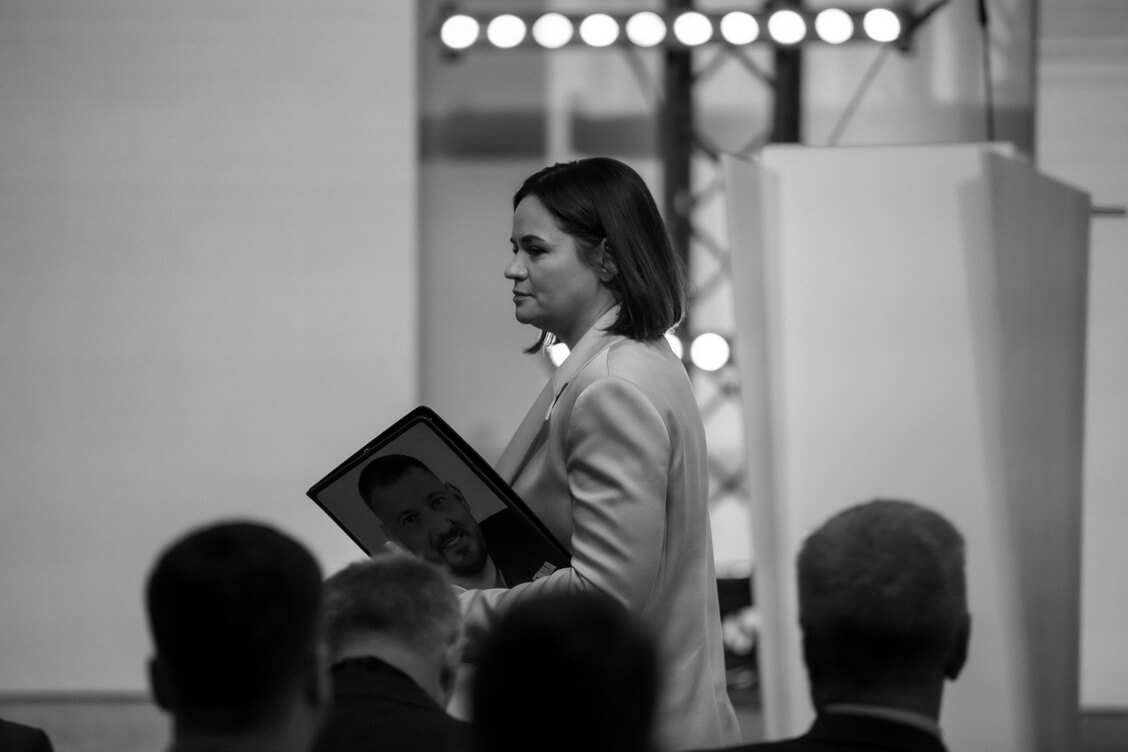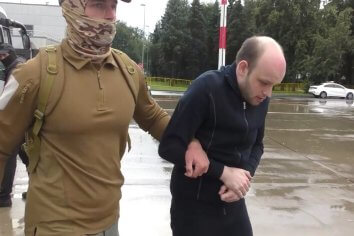Belarus’ opposition leaders at a conference in Vilnius on August 3-4 declared that their goal is to prevent Alaksandar Łukašenka from gaining international recognition as the president of Belarus after the 2025 presidential election. A government change in the country looks less likely than four years ago, with the 2020 uprising defeated and Łukašenka entrenching his authority through repression and close ties with Russia.

New Belarus strategy
Last December, the pro-democracy forces rallied around a strategy of transition to a New Belarus, hoping that Russia would be defeated by Ukraine soon.
The hope has not materialized. Russian troops are edging forward after months of virtual stalemate, so nothing seems to threaten the Łukašenka regime as long as it has the full backing of Putin.
Opposition has new defense chief
To her credit, Cichanoŭskaja quickly found a replacement for Valeryj Sachaščyk after he resigned as her cabinet’s defense minister on August 1, despite speculations about a staffing crisis in her camp.
Vadzim Kabančuk, the former second-in-command at the Ukraine-based Kastuś Kalinoŭski Regiment (KKR), filled the vacant position.
Sachaščyk reportedly failed to come to terms with the KKR, which is being reorganized in an apparent move by the Ukrainian military intelligence agency to take control of the Belarusian military unit. Kyiv definitely does not plan to allow the KKR to play a role in overthrowing Łukašenka.
Apparently for this reason, Belarusian fighters removed the KKR command have formed the Kalinoŭcy movement.
The movement, a military wing of the Belarusian opposition, sets the ambitious goal of organizing a Belarusian liberation army abroad.
Belarusian paramilitary groups in Poland and Lithuania are short of cash and equipment and beset by backbiting, Kabančuk complained at the conference. Their host countries are not interested in helping them, he added.
Clearly, the new opposition defense chief has a very complicated mission given that dictators only understand the language of force.
So far, Łukašenka has had a huge advantage in terms of brutal force with Moscow throwing its full weight behind him.
Political prisoners
The Belarusian ruler clearly has no intention to release more political prisoners despite international sanctions. The subject was high on the agenda at the conference.
Łukašenka despises those he calls ‘fugitives’ and refuses to negotiate with his exiled opponents. If he is ever willing to engage in any kind of dialogue on political prisoners, he will approach Western diplomats.
The opposition has no choice but to appeal to Western actors to keep the issue on their agenda.
One can hardly come up with a miraculous winning strategy, but it is important for the opposition to have at least a common position.
As Łukašenka remains defiant, it is hard for Western politicians to choose a right tactic. Maximalists call for heavier pressure on the regime, while others advocate a flexible approach and openness to a compromise.
Coordinating Council speaker Anžalika Mielnikava suggested that the council should be a forum to discuss ideas how to secure the release of political prisoners. The previous Coordinating Council spent a long time discussing this topic but never came up with a clear plan.
Ałana Hiebremaryjam, a Coordinating Council member who had served time in prison for dissent, told the conference that “a window of opportunity [for the release of political prisoners] has now opened and should be used.”
She criticized opponents of negotiations with the dictator, noting that even terrorists are approached when a prisoner exchange is necessary.
In early July, Łukašenka authorized the release of more than a dozen political prisoners. Therefore, he might be willing to negotiate with the West on other inmates.
Moreover, the recent prisoner exchange between Russia and the United States, in which Minsk played a part, showed that there are ways of saving certain people.
Cichanoŭskaja declared leader until fair election
The conference participants adopted a protocol declaring Cichanoŭskaja “the national leader” until a fair and free election in Belarus or until she steps down from that role.
Critics ridiculed the document, noting that Cichanoŭskaja has become an irreplaceable political figure just like Łukašenka.
The document, in fact, reflects the consensus among several pro-democracy groups supporting Cichanoŭskaja.
The big question is how Belarusians view Cichanoŭskaja as time goes by after her spirited presidential campaign of 2020. Protocols signed in Vilnius or Warsaw are not a guideline for those living in Belarus.
Opposition politician Andrej Jahoraŭ said that more Belarusians see the Łukašenka regime as legitimate.
It is difficult to prove it because comprehensive surveys in Belarus are impossible, but it looks like more and more people are losing interest in politics and focusing on the mundane realities.
Łukašenka and his propaganda machine have convinced a part of Belarus’ population that he saved the country from war.
Łukašenka wants Belarusians to turn the page on 2020, whether they like it or not. Therefore, the presidential election of 2025 could be a psychological turning point both for Belarusians and Western governments, even if it is a no-choice election.
Platform 2025
Platform 2025 is a rather declarative document adopted by the participants in response to this challenge.
It would be naive to anticipate more given the tough working environment under the repressive totalitarian regime.
It is still unclear whether the opposition will opt for a boycott or voting against all candidates. But unless the government suddenly gets into trouble, both strategies look likely to fail.
The key approach is still to try and win the information war and make sure the West does not recognize Łukašenka, as stated in Platform 2025.
However, the West’s non-recognition will not force Łukašenka to step down, while reprisals and support from the Kremlin can always offset his legitimacy deficit.
Fight or surrender?
The supporters of change in Belarus are living in tough times and understandably sometimes feel frustrated with pro-democracy leaders.
There are plenty of reasons to criticize political emigrants, but it is important to realize that evil is on the rise, and turning things around is not easy.
No opposition politician from Belarus has a plan to beat tyranny. To fight or surrender is still up to Belarusians.
